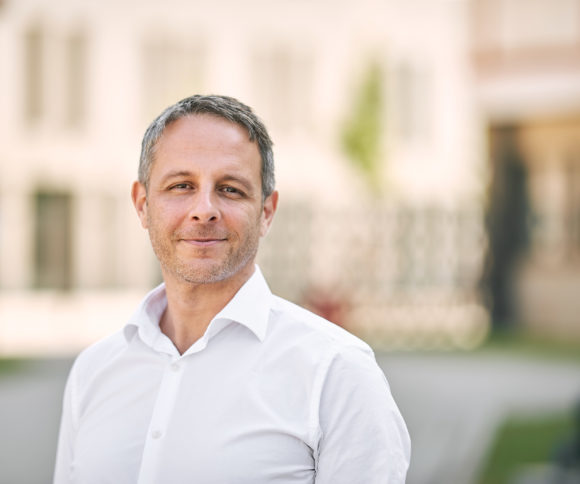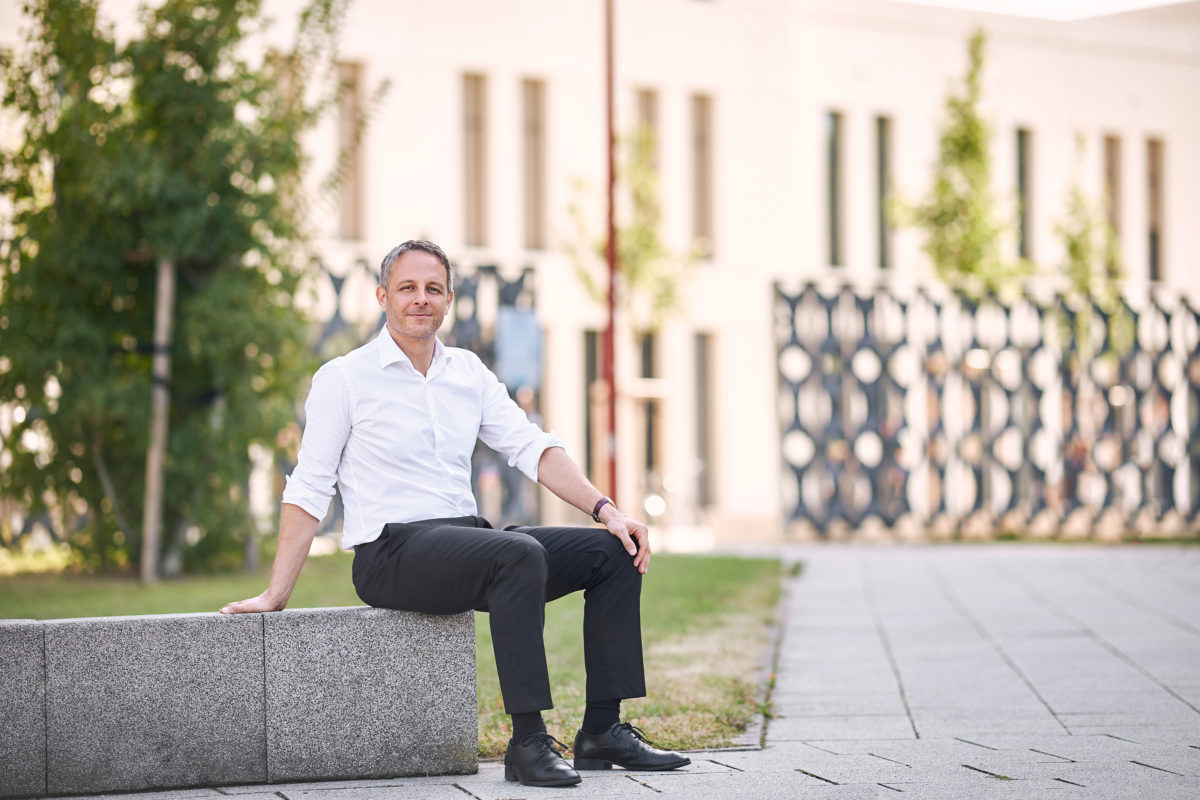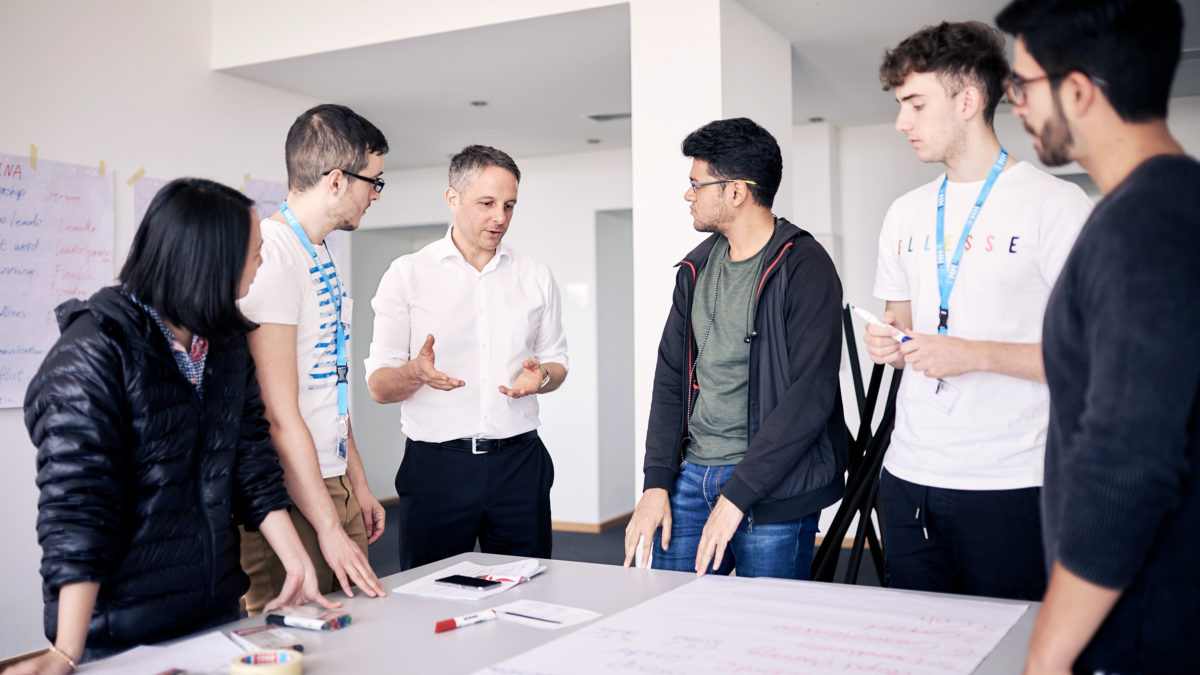
The Power of the HHL Community
Interview with Raphael Schoen, Executive Trainer, Consultant and Founder
This interview was first published in March 2020.
Raphael Schoen is an Executive Trainer and Consultant, helping international companies successfully transfer their business models abroad. Before launching his own business, he worked in International Management and completed his part-time MBA at HHL Graduate School of Management, graduating in 2015.
Raphael’s heart beats for two companies. He founded a company for training and consulting in international management and another company for negotiations.
He has returned to HHL as a PHD student at the Chair of International Management, focusing his doctoral degree on International Negotiations. In addition, Raphael offers a workshop in “Cultural Diversity and Team Dynamics” to HHL students. In this interview he talks about the importance of understanding cultural diversity and how the MBA completely changed his life.
“When you leave HHL, you see the world differently.”
What is your professional background?
Over the course of 15 years I worked in International Management, traveling to more than 30 countries. In my previous position as Global Business Development Manager I reported to the CEO of a US-owned High-Tech. company. My most important task was restructuring international subsidiaries that didn’t meet their KPI’s and company goals. An endeavor I was successfully able to resolve.
It turned out that often lack of understanding for the required soft skills and management practices led to misalignment or the failure of businesses. With this insight and after working in a very technical environment I had the desire to focus more on the interpersonal side of international business.
Today I am an executive trainer, consultant and business school lecturer dealing with people that work in similar environments as I did. Companies often face problems transferring successful business models from their home country to subsidiaries abroad, mainly because of different work and management styles. To overcome these challenges, organizational and management practices need to be adapted.
“I have been able to create my own career according to my personal interests and strengths.”
I help my customers analyze these challenges and train or consult Management in order to reach the companies’ international goals. This is especially vital for German companies with their high dependence on international trade. My customers range from German stock market companies over SME’s to Silicon Valley firms establishing their base in Germany.
My job profile is quite unique and hard to apply for. I have been able to create my own career according to my personal interests and strengths. In a way, I was able to invent my own job.

Tell me about your decision to study at HHL Graduate School of Management. What was your motivation to choose HHL?
I was in a situation where I needed a change in my career. I initially talked to several business schools in Germany and finally decided to go with HHL, mainly because it was the only business school that offered a part-time program that met my needs. I was also looking for something that promised to create meaning and purpose in my work. With its strong international orientation, HHL promised to widen my perspective and help me gain new knowledge.
“I was also looking for something that promised to create meaning and purpose in my work.”
To what extent does your work as a consultant benefit from your studies at HHL?
There are various situations, where I apply the knowledge I gained at HHL. For one, I use Porters 5 forces in international strategy for companies, Myers/ Briggs in organizational development, or the Harvard Method in negotiations. But mostly I apply the knowledge gained in my international Management class, e.g. applying the CAGE framework for international business entities and Cross-Cultural-Management. This extended Management knowledge I gained at HHL ideally complemented my knowledge gained in practice.
Why do you think an MBA at HHL is the best choice for people wanting to change something in their life?
HHL enables insights into best practices in business connected with the latest findings in research. Additionally, studying at HHL is an experience where you learn from your peers who come from different industries with different backgrounds, and from different countries in the world. What happens to you during these two years is a process of personal growth – you might not initially realize it– but when you leave HHL, you see the world differently.
How does your workshop “Cultural Diversity and Team Dynamics” prepare the students for their future careers?
It helps students deal with two crucial business challenges: First, it addresses the fact that students come from all over the world to study at HHL, bringing their own working styles and problem solving strategies to the classroom. At the same time, these different backgrounds complicate successful cooperation. Experience shows that – without training – it is more difficult to be successful in international class settings.

Students during the “Cultural Diversity and Team Dynamics” Workshop with Raphael Schoen.
Tolerance and benevolence are NOT enough if you don’t know why your classmates work differently and what factors make cooperation successful. Hence, one needs to understand that internationally there is no good and bad working practice, there is just different practices. By knowing how you can mitigate the culturally rooted working styles diverse teams will be more successful.
“It is absolutely crucial to know the “hidden” and unspoken laws of German business, in order to be successful.”
Additionally, I prepare the students for working in a German business environment. It is absolutely crucial to know the “hidden” and unspoken rules of German business, in order to be successful. For example, in negotiations the best data at hand doesn’t help if you don’t know how to present your data and form an argumentation line, in order to convince the person who makes the decisions on the other side of the table.
To what extent did the HHL Network help you during and after your studies?
The network helps significantly. First of all, I need to express my deep gratitude to the former chancellor of HHL Dr. Axel Baisch. He believed early on in the importance of Cultural Diversity, not only in teaching but also to make HHL attractive for international students. He gave me the first opportunity to teach at HHL.
Furthermore, the former dean Prof. Dr. Andreas Pinkwart helped significantly by providing me a contact to an international business network. Those were outstanding opportunities that still help me in business. Incidentally, my phone recently rang and a former P9 classmate was on the other line that offered me an interesting opportunity for teaching. So yes, the network is very helpful.
Raphael is an executive trainer and consultant for Negotiation and International Management, and business school lecturer.
Connect with him on LinkedIn.
His most recent publications Getting to Yes in the cross-cultural-context: ‘one size doesn’t fit all’ – a critical review of principled negotiations across borders and “Lacking pluralism? A critical review of the use of cultural dimensions in negotiation research” are part of this doctoral thesis and can now be found in the Management Review Quarterly (MRQ) by Springer and the International Journal of Conflict Management (IJCM) by Emerald.
How do your Ph.D. studies support your work as a consultant/management trainer?
Since I’m working on the interface between science and practice the doctoral program shows me how to read scientific papers more efficiently, how to judge the quality of a journal and an article, and how to extract the knowledge that I need for teaching and training. Additionally, the methodological approaches that sciences deliver help me in my daily work.
What’s your advice for MBA graduates entering the job market?
If you want to gain an advantage from the start, study and apply soft skills and emotional intelligence. This is what makes careers. With your HHL MBA and its fact-based business skills, you are best equipped and have the ticket into the C-Level network. But in order to succeed in this arena one needs to know about emotional and – in international business – Cross-Cultural-Factors. Knowing what motivates, what drives people and decisions gives you the competitive edge.
For MBA students that want to excel in Germany – you need to know how the unspoken rules of German business culture. How do Germans work?
Let me share an example. It might be common knowledge that being on time in Germany is very essential, not only so that the meeting starts on time, but also – and this is such an unspoken rule – because Germans connect trust to being on time. If this trust is violated, then your credibility is harmed with serious repercussions for your business relationship and possibly the deal itself. It can develop into a first-hand business killer.
“Knowing what motivates, what drives people and decisions gives you the competitive edge.”

Hi, I'm Pauline! As HHL’s Social Media Manager, I love bringing stories to life and creating diverse, engaging content for our community. Whether it’s student and alumni stories, reels & videos or blog articles. I’m always on the lookout for inspiring student and alumni stories, capturing the best moments on campus, and interacting with our followers. Thinking about being featured on our channels? Just reach out, I’d love to bring your idea to life!


